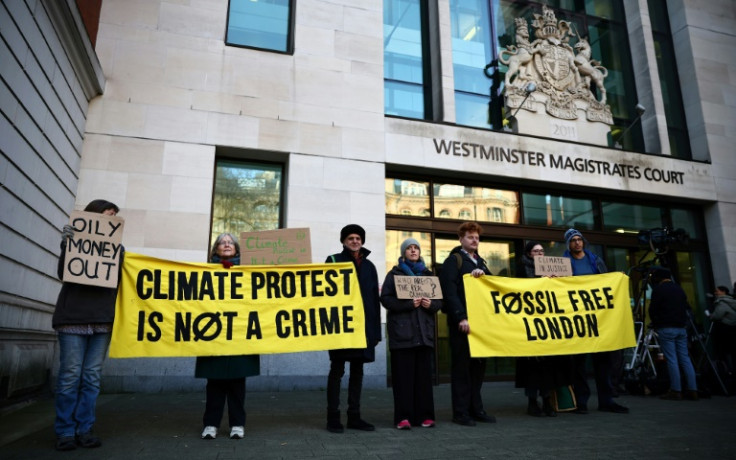
Activist Greta Thunberg defied police orders to move during a climate demonstration, prosecutors told a London court on Thursday, on the first day of her two-day trial for public order offences.
Westminster Magistrates' Court in central London heard that police gave the 21-year-old Swedish campaigner a "final warning" to move from outside the entrance of the London hotel hosting the Energy Intelligence Forum in October.
Prosecutor Luke Staton told court: "She said that she was staying where she was and so she was arrested."
Thunberg, who faces a maximum fine of GBP2,500 ($3,177), was taken away by two police officers and put into the back of a van outside after she joined the mass protest.
She was one of dozens of climate activists arrested for disrupting access to the conference, which brought together major oil and gas companies at a luxury hotel in the British capital on October 17.
Demonstrators greeted the forum participants with cries of "Shame on you!" while carrying placards reading "Stop Rosebank", a reference to a controversial new North Sea oil field that the government authorised in September.
Police arrested Thunberg for failing to adhere to an order not to block the street where the rally was taking place, with Staton telling court that people were unable to get into the hotel.
She was released on bail but then took part in another demonstration in front of the five-star hotel the next day, along with hundreds of other people.
Thunberg, a global figure in the fight against climate change, pleaded not guilty to the charges at an initial hearing in November, as did four other activists who are her co-defendants.
They were among dozens of activists arrested for disrupting access to the conference.
Supporters were already gathered outside court on Thursday when Thunberg arrived around an hour before the 10:00 am (1000 GMT) start of her trial.
They held large yellow signs reading "fossil free London" and "climate protest is not a crime" as Thunberg, wearing a grey coat, and her fellow defendants made their way through the throng.
Maja Darlington, campaigner at Greenpeace UK, said the activists were on trial "for peacefully protesting" while oil executives were "celebrating making billions from selling climate-wrecking fossil fuels".
"The prosecution of Greta and other peaceful protesters reflects a government that cares more about bolstering the profits of oil bosses than fighting for a liveable future for all of us," she added.
The Conservative government's reversals on its pledges to combat climate change have angered campaigners.
Prime Minister Rishi Sunak has postponed a ban on the sale of petrol and diesel cars and announced plans to grant new licences to drill for oil and gas in the North Sea.
The British electorate, which votes in a general election this year, is facing an inflation-fuelled cost-of-living crisis.
On Monday, the UK's independent advisory body on climate strategy expressed concern that the government was sending out "mixed messages" that were tarnishing its international influence on the issue.
Thunberg, who came to worldwide attention as a 15-year-old by staging school strikes in her native Sweden, regularly takes part in such demonstrations.
She was fined in October for blocking the port of Malmo in Sweden, a few months after being forcibly removed by police during a demonstration against the use of coal in Germany.
She also joined a march last weekend in southern England to protest against the expansion of Farnborough airport, which is mainly used by private jets.








